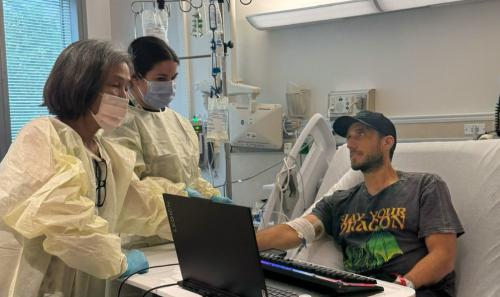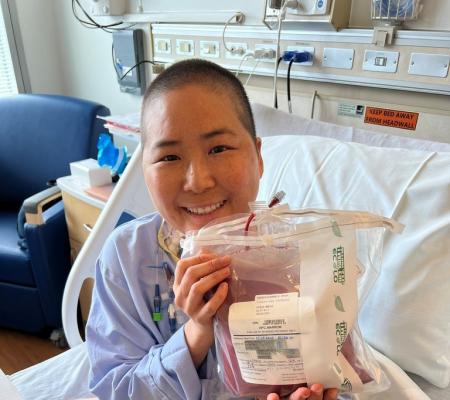
-
Understanding primary immunodeficiency (PI)

Understanding PI
The more you understand about primary immunodeficiency (PI), the better you can live with the disease or support others in your life with PI. Learn more about PI, including the various diagnoses and treatment options.
-
Living with PI
-
Addressing mental health
-
Explaining your diagnosis
- General care
- Get support
- For parents and guardians
-
Managing workplace issues
- Navigating insurance
-
Traveling safely

Living with PI
Living with primary immunodeficiency (PI) can be challenging, but you’re not alone—many people with PI lead full and active lives. With the right support and resources, you can, too.
-
Addressing mental health
-
Get involved

Get involved
Be a hero for those with PI. Change lives by promoting primary immunodeficiency (PI) awareness and taking action in your community through advocacy, donating, volunteering, or fundraising.
-
Advancing research and clinical care
-
Research Grant Program
-
Consulting immunologist
-
Diagnosing PI
-
Getting prior authorization
-
Clinician education
-
Survey research
-
Participating in clinical trials

Advancing research and clinical care
Whether you’re a clinician, researcher, or an individual with primary immunodeficiency (PI), IDF has resources to help you advance the field. Get details on surveys, grants, and clinical trials.
-
Research Grant Program
Caitlin Powell’s induction into the world of chronic granulomatous disease (CGD) began around age seven. At that time, she was experiencing abdominal pain due to an inflamed appendix. During the surgical removal of her appendix, doctors serendipitously noticed a large granuloma on her intestines. The next month involved a flurry of doctors’ appointments to determine why a seven-year-old would have a granuloma. Eventually, tests uncovered a diagnosis of CGD. “This was quite a surprise to me and my parents,” says Caitlin. “As far as we knew, there wasn’t any family history of CGD.”
Caitlin’s parents empowered her early on by giving her opportunities to talk with doctors and ask questions. “I began giving myself shots in elementary school,” explains Caitlin. “By allowing me to do so, they were helping me to feel more in control of the condition and the impact on my life.”
Over the years, Caitlin has mostly maintained her health, only experiencing a couple rough patches along the way. In seventh grade, she developed Aspergillosis, an infection caused by a common mold. Most people breathe in Aspergillus spores every day without getting sick. However, people with weakened immune systems, such as CGD, are at a higher risk of developing health problems from these mold spores. After graduating from college, she had a bowel obstruction caused from the granuloma she had as a child, which required surgery to repair. In 2014, she was hospitalized with esophagitis, commonly due to opportunistic infections in people with immunodeficiency.
Many teens find it challenging to make the transition from pediatric to adult healthcare but not Caitlin. “I worked at a pharmacy in high school and that taught me the importance of adhering to a treatment regime,” she explains. “With my parents allowing me to take early ownership of my management and my pharmacy experience, I was pretty well equipped to make the transition into self-care.”
These days, Caitlin manages her health with what she describes as the trifecta—antibiotics, antifungals, and Actimmune. “This keeps me pretty healthy.” While CGD does require management, Caitlin doesn’t sit back and let the disease steer her life. “While you have no choice in whether or not you have to live with CGD, you do have a choice in how you respond to it,” says Caitlin. “I don’t live my life walking around and asking Why me? Instead, I live my life with resilience and optimism.”
When asked how the diagnosis has affected life decisions, she responds, “Minimally. It had no bearing on my career choice as a teacher,” although she does concede taking extra precautions. “Flus and colds spread like wildfire in the classroom, so I am cautious to minimize my exposure.” Caitlin does acknowledge the largest impact CGD has had on her life is the choice of where to live. “I do need to live near a hospital and specialist who is knowledgeable about CGD,” says Caitlin. “Other than that, I’ve moved beyond being a person with CGD. I am just a person living life to its fullest.”
Related resources

Man with X-linked hyper IgM first-ever to receive novel gene therapy

Pharmacist with CVID receives bone marrow transplant

Undiagnosed: Reuben & Sherri Johnson on CGD, chronic illness, and the fight for healthcare
Sign up for updates from IDF
Receive news and helpful resources to your cell phone or inbox. You can change or cancel your subscription at any time.





The Immune Deficiency Foundation improves the diagnosis, treatment, and quality of life for every person affected by primary immunodeficiency.
We foster a community that is connected, engaged, and empowered through advocacy, education, and research.
Combined Charity Campaign | CFC# 66309

